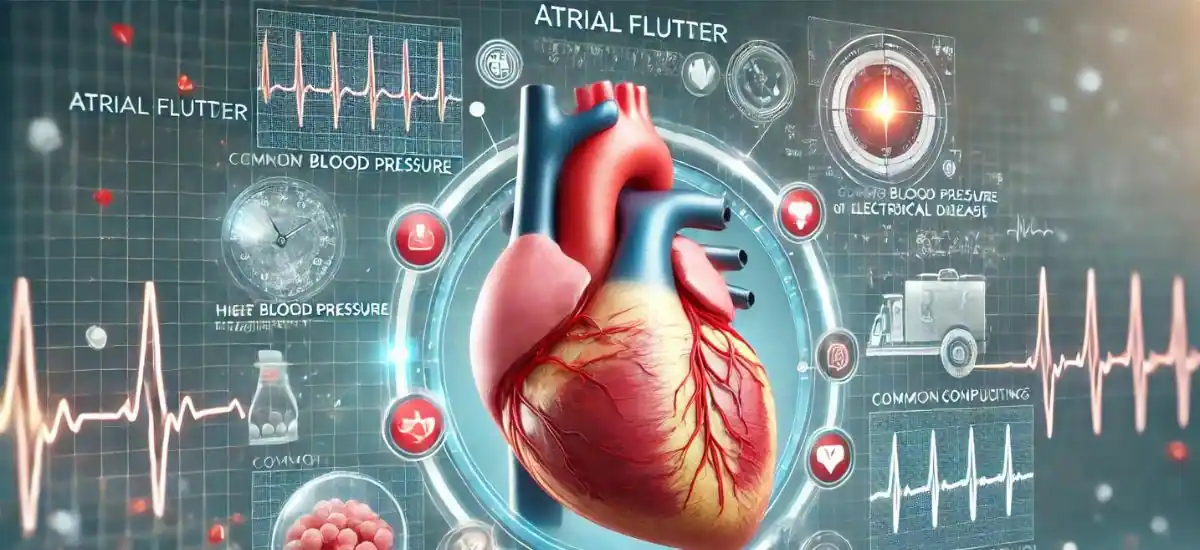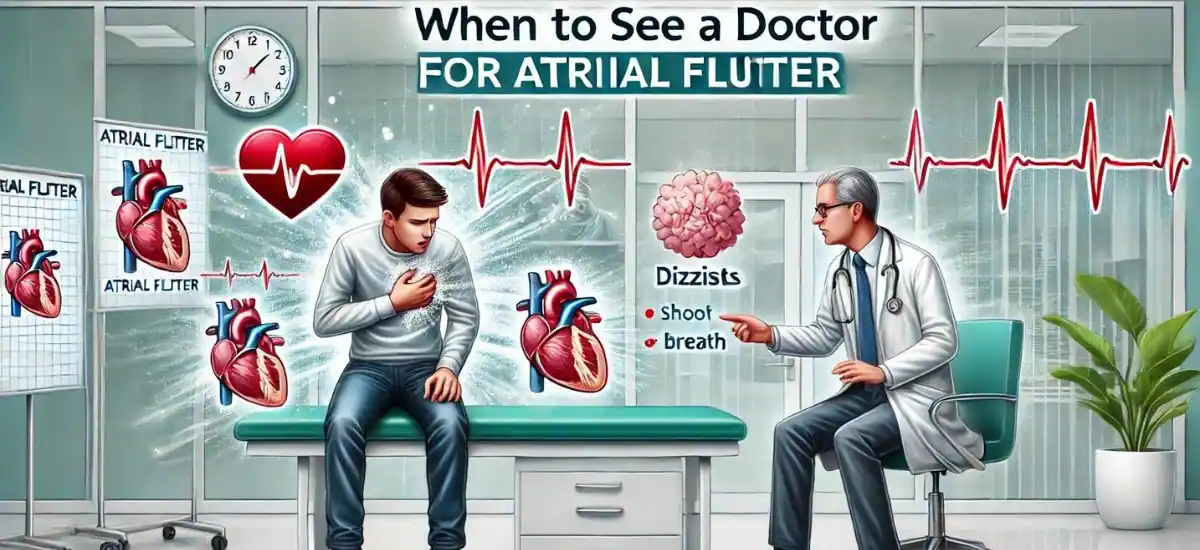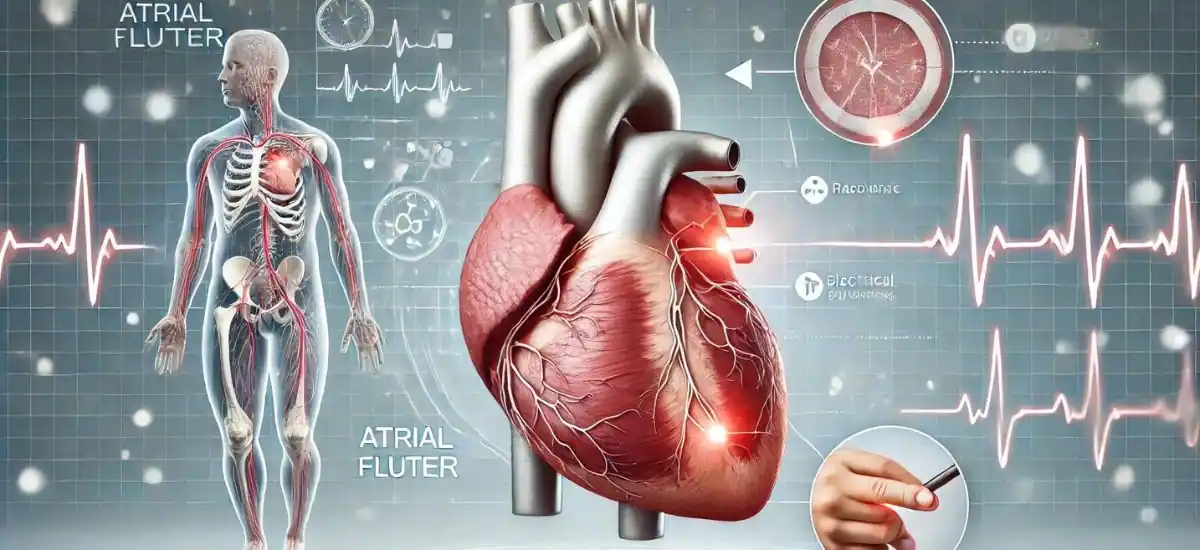Atrial flutter is a type of abnormal heart rhythm that causes the heart to beat rapidly. Common causes include heart disease, high blood pressure, thyroid issues, alcohol consumption, and stress. Symptoms often include palpitations, shortness of breath, fatigue, dizziness, and chest pain. Early recognition of these symptoms is crucial for prompt diagnosis and treatment to prevent complications like stroke and heart failure. Yes, atrial flutter has identifiable causes and symptoms, and recognizing them early can significantly improve treatment outcomes and quality of life.
Understanding Atrial Flutter
Atrial flutter occurs when the electrical signals in the heart’s atria are disorganized, causing the atria to beat quickly. This rapid beating can affect the heart’s ability to pump blood efficiently, leading to symptoms like palpitations and shortness of breath.
- Atrial Flutter vs. Atrial Fibrillation: Both atrial flutter and atrial fibrillation are types of arrhythmias, but they differ in their patterns. Atrial fibrillation is characterized by an irregular and often rapid heart rate, while atrial flutter is more regular but still abnormally fast. Understanding these differences is important for proper diagnosis and treatment.
Causes of Atrial Flutter

Several factors can contribute to the development of atrial flutter, including:
- Heart Disease: Conditions like coronary artery disease, heart failure, and valve disorders can increase the risk.
- Hypertension: High blood pressure puts extra strain on the heart, which can lead to atrial flutter.
- Thyroid Issues: Both hyperthyroidism and hypothyroidism can affect heart rhythm.
- Previous Heart Surgery: Surgical procedures on the heart can alter its electrical pathways, leading to arrhythmias.
By identifying these causes, individuals can take proactive steps to manage their risk factors and maintain heart health.
Underlying Health Conditions
Certain health conditions can increase the risk of developing atrial flutter. These include:
- Heart Disease: Conditions such as coronary artery disease, heart failure, and cardiomyopathy can lead to atrial flutter.
- Hypertension: Chronic high blood pressure can damage the heart and contribute to arrhythmias.
- Thyroid Issues: Both overactive (hyperthyroidism) and underactive (hypothyroidism) thyroid glands can affect heart rhythm.
- Diabetes: High blood sugar levels can damage the heart and blood vessels, increasing the risk of arrhythmias.
Recognizing and managing these underlying conditions can help reduce the risk of atrial flutter.
Lifestyle and External Factors
Certain lifestyle choices and external factors can also contribute to atrial flutter:
- Alcohol Consumption: Excessive drinking can trigger arrhythmias, including atrial flutter.
- Smoking: Tobacco use damages the heart and blood vessels, increasing the risk of heart rhythm disorders.
- Stress: Chronic stress can affect the heart’s electrical system, leading to arrhythmias.
- Stimulant Use: Drugs such as caffeine, nicotine, and certain medications can induce atrial flutter.
Making healthy lifestyle choices can help prevent atrial flutter and improve overall heart health.
Common Symptoms of Atrial Flutter
The primary symptoms of atrial flutter can vary but often include:
- Palpitations: A feeling of rapid, fluttering, or pounding heartbeats.
- Shortness of Breath: Difficulty breathing, especially during physical activity.
- Fatigue: Feeling unusually tired and weak.
- Dizziness or Lightheadedness: Feeling faint or unsteady.
Recognizing these symptoms early can lead to prompt diagnosis and treatment.
Physical Symptoms
Atrial flutter can cause noticeable physical symptoms, such as:
- Palpitations: Sensation of a rapid or irregular heartbeat.
- Shortness of Breath: Breathing difficulties, particularly during exercise or exertion.
- Fatigue: Persistent tiredness and lack of energy.
- Chest Pain: Discomfort or pain in the chest area.
These symptoms can be distressing and impact daily activities, so it’s important to seek medical advice if they occur.
Systemic Symptoms
Beyond physical symptoms, atrial flutter can have systemic effects on the body:
- Dizziness: Feeling lightheaded or faint.
- Chest Pain: Sharp or dull pain in the chest.
- Fainting: Sudden loss of consciousness.
- Sweating: Excessive sweating without physical exertion.
These symptoms indicate that atrial flutter is affecting overall health and requires medical attention.
When to See a Doctor

It’s crucial to seek medical advice if you experience:
- Persistent palpitations or irregular heartbeats.
- Shortness of breath that doesn’t go away.
- Chest pain or pressure.
- Unexplained dizziness or fainting.
Early intervention can prevent complications and improve outcomes.
Diagnostic Approaches
To diagnose atrial flutter, doctors may use several methods:
- ECG (Electrocardiogram): Measures the electrical activity of the heart to detect arrhythmias.
- Holter Monitor: A portable device worn for 24-48 hours to continuously record heart activity.
- Electrophysiological Studies: Tests that map the heart’s electrical system to identify arrhythmias.
These diagnostic tools help determine the presence and type of atrial flutter, guiding appropriate treatment.
Potential Complications
Untreated atrial flutter can lead to serious complications, such as:
- Stroke: Increased risk due to blood clots forming in the heart.
- Heart Failure: The heart’s inability to pump blood effectively.
- Chronic Fatigue: Ongoing tiredness affecting quality of life.
- Cardiomyopathy: Heart muscle disease that makes it harder for the heart to pump blood.
Recognizing the importance of treatment can prevent these complications.
Frequently Asked Questions
Q1. What causes atrial flutter?
Ans: Atrial flutter can be caused by heart disease, high blood pressure, thyroid issues, and lifestyle factors like alcohol consumption and stress.
Q2. What are the symptoms of atrial flutter?
Ans: Common symptoms include palpitations, shortness of breath, fatigue, dizziness, and chest pain.
Q3. Can atrial flutter be treated?
Ans: Yes, treatment options include medications, lifestyle changes, and medical procedures like catheter ablation.
Conclusion
Understanding the causes and symptoms of atrial flutter is crucial for early detection and effective management. By recognizing the signs and seeking medical advice promptly, individuals can improve their heart health and prevent complications.


